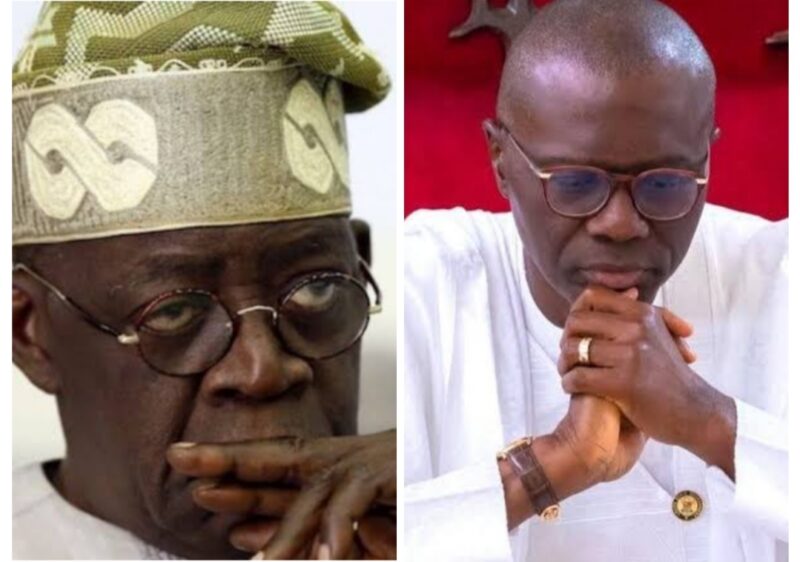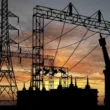What used to be a cordial relationship between President Bola Ahmed Tinubu and Lagos State Governor Babajide Sanwo-Olu appears to be weakening, with clear signs that the political bond they once shared is no longer intact.
Though neither of the two men has spoken publicly about any disagreement, recent events and insider sources suggest a silent but growing distance that could affect both Lagos politics and the All Progressives Congress (APC) at large.
During President Tinubu’s most recent visit to Lagos, the tension between him and Sanwo-Olu became difficult to ignore. Observers who witnessed the arrival at the Murtala Muhammed Airport noted that Tinubu walked right past Sanwo-Olu without a handshake or acknowledgment. Instead, he greeted Deputy Governor Obafemi Hamzat, a move many say was intentional.
According to sources close to both camps, this cold gesture was not accidental. Members of the President’s media team were reportedly instructed not to release any footage that would confirm the awkward encounter. “There was an effort to control the optics,” one insider said. “No one wanted the tension to become too obvious, especially to the public.”
In previous visits, it was routine for the sitting Lagos governor to accompany the President to his Bourdillon residence. This time, however, that role was assigned to Deputy Governor Hamzat, further highlighting Sanwo-Olu’s exclusion.
What caught the attention of many political watchers was the governor’s absence from major events during the President’s stay, including the 50th anniversary celebration of the Economic Community of West African States (ECOWAS), held at the Nigerian Institute of International Affairs (NIIA) in Victoria Island.
Considering the event was not only held in Lagos—the birthplace of ECOWAS—but also attended by the President, the absence of the state’s governor raised eyebrows. A member of Sanwo-Olu’s media team explained the governor was “engaged elsewhere,” but many felt the excuse was unconvincing, especially for such a high-profile event.
Sources within the APC claim that Governor Sanwo-Olu was nearly excluded from the official protocol manifest for welcoming the President. His inclusion, they say, only came after “intense lobbying and last-minute intervention” by influential figures within the party.
Adding to the intrigue was the low turnout of Lagos APC leaders, especially members of the powerful Governors Advisory Council (GAC), at Tinubu’s Bourdillon residence. While some political associates were seen visiting the President, the usual atmosphere of solidarity and fanfare was noticeably missing.
Empowered Newswire can confirm several possible reasons behind the rift. One of the leading theories involves the events surrounding the attempt to remove Lagos State House of Assembly Speaker Mudashiru Obasa.
According to Empowered Newswire report, 32 out of the 40 lawmakers had signed a resolution to oust Obasa after a meeting with Governor Sanwo-Olu. Reports claim the governor not only supported the move but also financed it, with the aim of replacing Obasa with his ally, Mojisola Meranda.
This move, however, was swiftly stopped by President Tinubu. Sources say Tinubu summoned top stakeholders and insisted that Obasa remain Speaker, citing the need for party stability. Many insiders saw Sanwo-Olu’s actions as an act of betrayal—a serious offence in Tinubu’s inner circle.
The aftermath was immediate. Sanwo-Olu’s influence within the party began to decline. His exclusion from the APC’s National Policy and Performance Review Summit in Abuja—where Tinubu was formally endorsed for a second term—was another public signal that he was no longer in the President’s good books.
Then came the build-up to the APC’s July 2025 local government primaries. In past election cycles, Sanwo-Olu played a significant role in selecting candidates for local council seats. But this time, his presence was barely felt. None of the 57 candidates chosen for chairmanship positions across Lagos State were linked directly to his political camp. Party insiders say this shift was no coincidence. According to them, a quiet directive came from Abuja—no special favours for governors or GAC members.
Observers believe this was part of a broader effort by President Tinubu to regain full control over Lagos politics. Over time, his protégés have gained more independence, and the President is now said to be taking steps to re-centralize power, especially as he prepares for the 2027 elections.
This reshuffling of power has not gone unnoticed. Some of Sanwo-Olu’s key allies were disqualified during the screening process for local elections. Others withdrew under pressure, replaced by fresh candidates said to be loyal to emerging power blocs with strong ties to the Presidency.
This quiet isolation has led many to wonder whether Sanwo-Olu will complete his term with full backing from the party machinery that helped him into office in 2019 and re-elected him in 2023.
Adding further stress to the situation is the EFCC’s ongoing investigation into Aisha Achimugu, a prominent oil marketer. Though the commission has publicly stated that Sanwo-Olu and former Vice President Atiku Abubakar are not involved, party insiders claim the case has been used by some within the APC to smear the Lagos governor.
Whispers of financial links and suspicious donations have been quietly circulated, and this, critics say, has given Sanwo-Olu’s political enemies more ammunition.
Many observers see a pattern emerging—one where political leaders brought into power by Tinubu eventually fall out of favour. The same happened with former Governors Babatunde Fashola and Akinwunmi Ambode. Fashola, despite his achievements, faced difficulties securing a second term and was pressured to change his deputy to please Tinubu’s camp. Ambode, on the other hand, was completely denied a second term, with Sanwo-Olu handpicked as a “safer” alternative.
But now Sanwo-Olu seems to be walking the same political tightrope. Unlike his predecessors, however, his decline in influence is playing out in the open. From his absence at major state and national events to his shrinking influence over local party structures, it is clear that the governor is no longer in full control of the Lagos APC.
Critics argue that this repeated breakdown in relationships has harmed governance in Lagos. Each time a governor falls out with his political godfather, ongoing projects are either stalled or abandoned. Fashola’s urban renewal plans were largely ignored by Ambode. In turn, Sanwo-Olu has been accused of ignoring some of Ambode’s transport and traffic infrastructure projects.
This cycle, according to some analysts, is a result of politics being based more on loyalty than performance. When loyalty is prioritized above governance, continuity suffers. Projects are shelved not because they are unimportant, but because of the desire to make a clean political break from the past.










